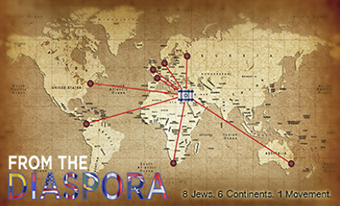‘From the Diaspora’
Permanent link
While he was growing up in Glenview, Judaism and Israel remained two separate conversations for 26-year-old Scott Frankel.
"Israel was intimidating for me, primarily because I hadn't yet had an understanding or relationship with Israel. Then in college I saw a study that concluded that as each new generation of American Jews continues to pass, there's a greater disconnect with Israel. When I saw this, I realized it was time for me to begin to understand what my Jewish identity consists of, and Israel's place within that."
So after graduating college in 2009, Frankel took off to Tel Aviv with his camera in hand. While working at a documentary production company, he decided to create a film of his own.
"I wanted to create an original film that accomplished three main things: First, I wanted to tell a story that was non-political--to present a story from Israel that might be unknown to many, and framed in a fresh and creative style. Second, I wanted to capture this moment in time. Israel is very young--only 65 years old--and as it continues to develop, I wanted to take a snapshot of early 21st century life. And last, I wanted to understand what it means to be a Jew today, and the importance of Israel to that definition."
Over the next 10 months he shot more than 65 hours' worth of interviews with eight young Jews from six continents and "From the Diaspora" was born.
Oy!Chicago talked with Frankel, who now works for the iCenter here in Chicago, about his film and what it taught him about Israel, Jewish culture, and identity.
Oy!Chicago: How did you find the olim (immigrants) featured in the film?
Scott Frankel: In Tel Aviv, it's so easy to meet people. Chatting in line, or at the coffee shops, on the beaches, and hearing different dialects and accents all over the city…I was naive to how the Jewish communities and culture that existed around the world, and even though their stories were so much different than mine, there was a common thread that strung across them all.
What was the most surprising thing you learned during this process?
Something that has been significantly strengthened is my understanding of the community of Judaism. Everyone has their own practices and customs and culture and beliefs, and no matter what they are there's this underlying connection that can't be described, only felt. The magnitude of this was something that was known to me, but not yet understood until my arrival in Israel. And now it's in the forefront of my life, no matter where I am.
On your website, you say this is "a documentary unlike any other about aliyah (immigration to Israel), Judaism, or Israel. How so?
"From The Diaspora" is less a story about aliyah, and more a story about Jewish identity. Aliyah makes a great narrative spine because it's a big decision in one's life. It inherently forces one to dig deep to answer difficult questions about who they are, what they want with their life, and why it all matters. Aliyah is an entry point into a journey of self-discovery, and that's what this film is really about and why it's very different from other films surrounding aliyah.
What's next for you?
Now comes the film's distribution. "From The Diaspora" is a launching pad for discussion, and the goal is to host screenings and discussions in circles around North America and overseas. Bringing together Israelis and Americans, parents and children, students and educators, etc. I have some ideas about a 5 year follow up with the characters, and also perhaps a new group spanning 8 new countries, but one step at a time...
What else should we know about the film?
Before heading to Tel Aviv and starting this project, I was indifferent about Israel…But this experience has really opened a world of new understanding and conversation for me. I realized that my indifference was the biggest threat to Israel, and I hope to open some doors for others like me. Documentaries are a medium that have always spoke loudest to me, so I'm hoping to empower others to continue exploring through their own lenses.
For more information, including where you can order or download your copy today and how to book screenings and discussions, visit www.fromthediaspora.com.



.jpg)



